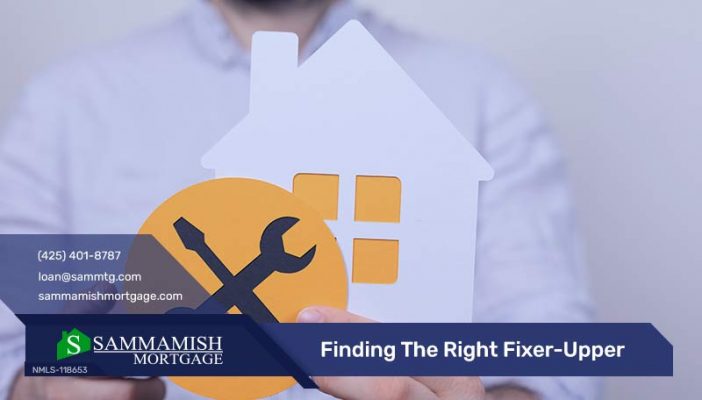No Obligation and transparency 24/7. Instantly compare live rates and costs from our network of lenders across the country. Real-time accurate rates and closing costs for a variety of loan programs custom to your specific situation.

If you’re in the market for a new house, you may be considering buying a fixer-upper. These homes come with their share of challenges and provide homeowners the opportunity to pick up properties for less than expected.
Fixer-uppers can be a great way to get into a home without breaking the bank. Of course, there is no denying the fact these homes frequently have upgrades, maintenance, or cosmetic work that has not yet been completed. But, in today’s housing market, opting for a fixer-upper might be just what you need. And while purchasing a fixer-upper typically involves more work and some elements may lack style, or the house location may need updating—the advantages far outweigh the disadvantages. Fixer-uppers offer potential homebuyers the chance to make their dream houses a reality. They also provide an affordable option for homeowners who aren’t sure how much they want to spend on a home. That said, if you are considering buying a fixer-upper, there are a few things you should think about before you make your decision.
The U.S. housing market has been red hot for the past few years, with home prices steadily rising and a seemingly endless supply of buyers who want a piece of the action. And in the current post-pandemic housing market, a new set of market opportunities are emerging. Yet not too long ago, Americans wanted move-in ready or turnkey homes, but now with even higher home prices and low housing inventory, they’re looking for fixer-uppers. So, why should you? Well, the right fixer-upper could be a profitable investment with significant appreciation potential. In hot housing markets, potential buyers look for ways to increase the value of their homes. A fixer-upper is one of those ways to do so. And in a very tight market, people looking for homes for sale can find great values, lower purchase prices, less competition, and instant equity in fixer-uppers.
Moreover, as briefly suggested, the right property can mean that you may be able to purchase a home for less than other comparable homes. A fixer-upper will allow you to get into a property that is within your budget and take advantage of low prices. Plus, if you want to do some of the renovations yourself and make an old home into your brand new dream home, the opportunity is there. Of course, you have many other choices in the real estate market today, including homes that are brand new. But if you are looking for something that has real potential, buying a fixer-upper is definitely an option.
When buying a fixer-upper, buyers are typically looking for good bones and some great possibilities. This means you will need to think outside the box when it comes to what you can save up to purchase. There are plenty of houses around the country that need work, but they might not be right for you. That said, if you are in the midst of house hunting for a home that needs a little TLC, here are some things to consider:
Not all cities are created equal when it comes to fixing up old homes. Therefore, you should try and find an area where crime rates are low and where home values are low enough, so the house is affordable even in a hot market.
The best neighborhoods have areas that attract families and offer conveniences similar to what you will find in the suburbs in most major cities. So, first things first, you should consider working with real estate agents who know the market you are interested in well. A knowledgeable realtor can be invaluable here and can be a resource when it comes to specific neighborhoods.
Ideally, you should try to find a home going through a thorough renovation process rather than one that has been left untouched or in a state of disrepair. Fixing up most homes will cost somewhere between $10-$40 per square foot, depending on the complexity of the job. Therefore, it is in your best interest to look at buying something with decent bones from the get-go. Pro Tip: get a home inspection and estimate renovation costs before you buy.
For some, buying an old home is an exciting adventure. For others, it’s a challenge. But be that as it may, recent data shows that buyers are still buying fixer-uppers. And they are getting them for lower prices, too. But as the market begins to cool and building material prices continue to soar, more than a few buyers are taking a little more time to renovate. Other challenges associated with purchasing a fixer-upper often center around the following:
In general, fixer-uppers are riskier investments because they require rehabilitation. As a result, a lot of people assume that buying an older home is a bad idea. The worry is that older homes have major problems with the foundation, roof, plumbing, wiring, paint, etc., and that they will need a lot of fixing up. Major issues can also mean ongoing renovations, which could mean you are living in a construction zone for months. But buying a fixer-upper comes with some inherent risks, whether it’s an old house or an unfinished property. Even so, there are plenty of good reasons to buy an older house. For one, they can often be cheaper. Secondly, overall, older homes often require less maintenance and tend to cost less than newer homes.
Nonetheless, finding financing can sometimes be a major challenge, especially if the house requires extensive updating. Thus, if you buy a home that needs major repairs, you should be prepared to shell out some cash. Understandably, most people don’t have much extra cash after making the down payment and paying closing costs, so coming up with additional money to cover repairs or remodeling can be difficult. This is why it is important to explore fixer-upper loan options like the Federal Housing Administration (FHA) 203 (k) rehabilitation loan or the Fannie Mae Homestyle Renovation Mortgage. You can fund the home purchase with either of these options and have a reserve in escrow for renovations. Of course, if you opt for a home that only requires cosmetic updates, then securing financing should be fairly straightforward.
Along those same lines, fixing up an old home and maintaining the property can require permits and be costly. This is especially true if you purchase an older fixer-upper, as they often have outdated systems, which can raise utility bills. Moreover, buying an older home typically means buying an older property. That means there could be restrictions on what you can do to the property. For example, some older homes may not have permits for renovations. Consequently, it pays to do your research here and budget accordingly. So, do yourself a favor and find out exactly what permits you may need, what repairs need to be done, as well as how much it will cost to maintain the property before you buy.
Fixer-uppers are an affordable way to get into a new home, especially in a hot housing market. This type of investment is right for people who are ultimately up for the challenge. The key is to pick the right house that needs minimal work at best and has good bones.
Are you curious about mortgages or the fixer-upper home buying process? If so, Sammamish Mortgage can help. We are an online mortgage company from Bellevue, Washington, serving the entire state, as well as Oregon, Idaho, and Colorado. We currently offer many mortgage programs, loan products, and services to buyers all over the Pacific Northwest and have been doing so since 1992. Contact or call us today with any questions you have about mortgages.


Whether you’re buying a home or ready to refinance, our professionals can help.
{hours_open} - {hours_closed} Pacific
No Obligation and transparency 24/7. Instantly compare live rates and costs from our network of lenders across the country. Real-time accurate rates and closing costs for a variety of loan programs custom to your specific situation.